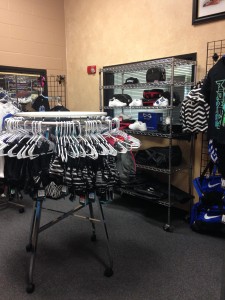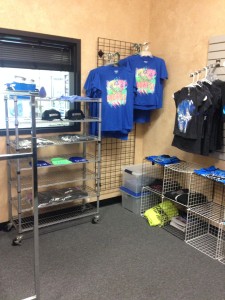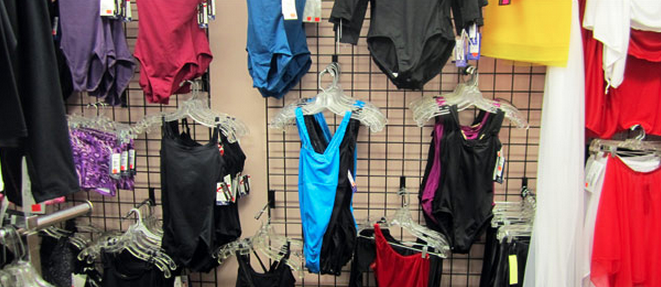Putting the “Pro” in Pro Shop
Running a gym takes stamina, patience, resilience and the ability to multi-task like a superhero. Add a pro shop into the mix and things get even more hectic—and, if it’s managed well—even more rewarding.
 Many gyms start pro shops to sell team merchandise and cheer-related items in an effort to supplement the revenue that comes from running all-star teams and classes. Though it can feel like yet another thing to add to an already very full plate, pro shops can be a huge moneymaker and help increase the profile of the gym. It takes physical space (unless the shop is online-only), manpower and the ability to juggle a side business, but for many gym owners, the sacrifices are well worth it.
Many gyms start pro shops to sell team merchandise and cheer-related items in an effort to supplement the revenue that comes from running all-star teams and classes. Though it can feel like yet another thing to add to an already very full plate, pro shops can be a huge moneymaker and help increase the profile of the gym. It takes physical space (unless the shop is online-only), manpower and the ability to juggle a side business, but for many gym owners, the sacrifices are well worth it.
“Opening a pro shop was the best thing we could have done for our business,” says Tara Lezin, pro shop director at Tampa-based Brandon All Stars. The gym trains approximately 300 all-star athletes per year from Levels 1-5, and the program has tripled in size since they started nearly a decade ago. When they opened the pro shop three years ago, they were cash and check only, and Lezin was very hands-on, “pressing a lot of rhinestone items and heat transfers” herself. From those DIY beginnings, they established a client base and started reaching out to companies in the area to provide more inventory for the shop.
Like opening a gym, opening a pro shop is a sizable undertaking that requires teamwork. Lezin says they have parents who work the shop when it’s open, and she has an assistant to help with the online store. “Our best-selling items are our Level 5 team items,” Lezin says. “The kids love to represent their favorite teams.” When they mark up the products, they make sure to have a wide selection catering to different family incomes, so that everyone can find something affordable.
Lezin says that, like any new venture, there will be challenges along the way, but in the end, it’s worth it. “The best advice I can give is to find vendors you trust and that back up the quality of their product,” she says. “It’s your brand and you want it to reflect your gym, just like your teams.”
 As for Midwest Cheer Elite, owner Tanya Roesel started its pro shop six years ago when they moved into a larger location. Employees do double-duty, with the front office staff also managing the pro shop, stocking and straightening inventory and selling items. It’s a system that works well for the gym, as evidenced by the booming pro shop.
As for Midwest Cheer Elite, owner Tanya Roesel started its pro shop six years ago when they moved into a larger location. Employees do double-duty, with the front office staff also managing the pro shop, stocking and straightening inventory and selling items. It’s a system that works well for the gym, as evidenced by the booming pro shop.
Midwest Cheer Elite is a 24,000 square-foot facility that has been in business since 2003; the gym currently houses over 500 competitive athletes on more than 25 teams. Even with those strong numbers, Roesel says that about 25 percent of income comes from the pro shop. The physical space was once Roesel’s office, but was renovated to accommodate the pro shop. They don’t yet have an online component, but do a lot of marketing via social media, providing photos, sizes and pricing so parents and kids can see what is coming down the pike.
As far as marking up their merchandise, Roesel says that if items are already expensive wholesale, the markup can be five or 10 dollars. When they are a bit cheaper, it can be up to 50 percent. And even if they don’t make much profit on an item, it still serves a purpose: “Our philosophy is: the more we have our logo or brand on a customer, the more advertising it provides for our brand,” Roesel says. In that way, the demands of running the shop are well worth it.
To push items, they order in low quantities and market items as a “one-time thing;” that way, there is always something new for customers to buy. During events like their Fall Showcase, they hold brand-new items until the event happens and then bring them out for a one-time sale. “We literally can sell up to $40,000 in pro shop in one hour,” Roesel says. “It’s like Black Friday, and parents start lining up hours before the sale with lists.”
To date, the best-selling items at Midwest Cheer Elite have been “anything with bling or sparkle,” according to Roesel. But it’s all part of a bigger end: when the parents and kids are proud of their teams, they want to show that pride off by wearing T-shirts, using key chains or buying bumper stickers boasting the logo of their gym—and that’s why pro shops can be such a lucrative endeavor.
–Dina Gachman







